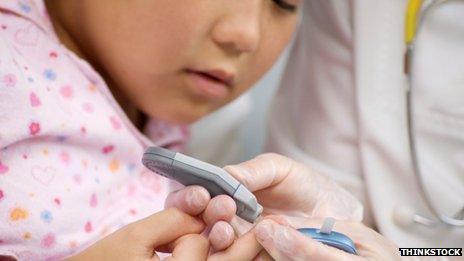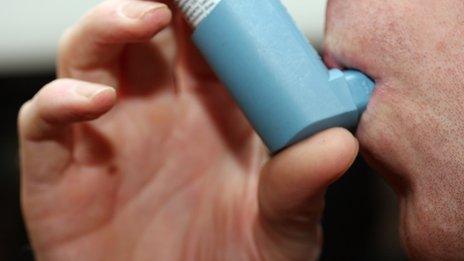Schools 'could struggle' with medical conditions policy
- Published

Schools in England could struggle to implement new policies for children with medical conditions such as asthma, diabetes and cancer, head teachers say.
From September, governing bodies will have a duty - under the Children and Families Act 2014 - to ensure schools make arrangements for these pupils.
A medical conditions policy will be required, ensuring pupils with such issues have full access to education.
Guidelines are being sent to all pupil referral units, schools and academies.
The Department for Education's revised guidance, being sent to schools on Thursday, says:
a medical conditions policy must be in place, so that pupils with medical conditions have full access to education, including school trips and physical education
governing bodies should ensure this policy is reviewed regularly and is readily accessible to parents and staff
appropriate training for school staff must be arranged
governing bodies should ensure that school leaders consult health and social care professionals, pupils and parents to ensure children's needs are effectively supported.
The guidelines say: "Parents of children with medical conditions are often concerned that their child's health will deteriorate when they attend school.
"It is therefore important that parents feel confident that schools will provide effective support for their child's medical condition and that pupils feel safe."
'Logistical issues'
But Russell Hobby, general secretary of the National Association of Head Teachers, said there were concerns about the implementation of the guidelines.
"We foresee three main logistical issues with the guidance, the foremost being the timescale of implementation in the context of the raft of other changes schools are obliged to implement.
"Staff will need to be trained to cope with particular conditions and heads will now need to ensure that the required individual pupil healthcare plans for those children with medical needs are in place.
"The second concern is that school leaders may be faced with a situation where none of their staff volunteer for the extra medical responsibility when it comes to invasive administration of medicines.
"The guidance relies heavily on governors writing policies and on free access to the school nursing service. However, feedback from our members suggests that there are regional variations in availability of support from the school nursing service."
Brian Lightman, leader of the ASCL head teachers' union, said: "It's important that schools are equipped to deal with medical conditions, but I'm not convinced that requiring them to have a policy on it will make much of an impact.
"If there were more of an emphasis on helping schools to access guidance and good practice, that could start to make a visible difference."
'Proper support'
But the circulation to schools of the guidelines has been welcomed by charities which had campaigned for the Children and Families Act to ensure better provision for children with medical conditions.
Barbara Young, chief executive of Diabetes UK, said: "We welcome the government's new statutory guidance as it will provide schools with the duties they will need to follow to help ensure over a million children with a medical condition will get the proper support that they need in school.

Schools in in England must have a medical conditions policy that is reviewed regularly
"We will be working with schools to help them implement these new duties so that they have the right policy, and practical support to meet the needs of children with medical conditions."
Laura Courtney, head of policy and public affairs at cancer charity CLIC Sargent, said: "Families of children with cancer tell us that tailored support when a child or young person first returns to school following a period of illness can make a real difference to their future education and development.
"This new statutory guidance is a really significant step towards ensuring that schools can feel confident in providing this support."
Kay Boycott, chief executive of Asthma UK, also welcomed the guidance.
"On average there are two children in every classroom with asthma but many of these children are not receiving the support they need at school," she said.
"Too often children with asthma are missing out on lessons, school trips and activities, or are being denied access to their own inhalers, which is putting their lives at risk."
- Published24 April 2014
